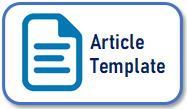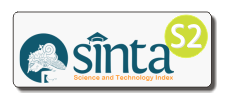Is Islamic Banking Social Performance Able to Maintain Stock Price Stabilization by Exploring the Role of Profitability As An Intervening Variable?
DOI:
https://doi.org/10.14421/grieb.2024.121-04Keywords:
Sharia Banking, volatility stock price, ARCH, GARCHAbstract
This study aims to analyze the effect of profitability as an intervening variable on the Islamic and social performance of Islamic Banking in order to maintain earnings per share. The purpose of maintaining earnings per share is to attract investors to invest in Islamic bank issuers. Therefore, this study also endeavors to forecast Islamic banking stock price volatility for companies listed on IDX and propose a framework for its mitigation. This framework considers the role of social performance in enhancing profitability, utilizing the path analysis method. This study focused on 3 Islamic banking companies (PNBS, BRIS, and BTPS) as a sample, using quarterly data specifically for the period of 2017 to 2021 with a purposive sampling method. In addition, Data sources include financial statements encompassing profit-sharing ratio, distribution of zakat, and distribution of qard al-hasan. Furthermore, this study employed an ARIMA regression model, subsequently adjusted using ARCH (Autoregressive Conditional Heteroscedasticity) and GARCH (Generalized Autoregressive Conditional Heteroscedasticity) as an analysis method for data forecasting. Based on the path diagram, it indicatedd that all hypotheses are accepted except for qard al-hasan, which has a significant and negative effect on profitability and stock prices. Therefore, based on these findings, this study contributes to expanding the scope of knowledge in the field of Sharia finance, as well as offers valuable guidance to Islamic finance industries on maximizing Islamic and social instruments to increase profitability, ultimately leading to a positive effect on stock price volatility.
References
Azrak, T., Saiti, B., Kutan, A., & Engku Ali, E. R. A. (2020). Does information disclosure reduce stock price volatility? A comparison of Islamic and conventional banks in Gulf countries. International Journal of Emerging Markets, October. https://doi.org/10.1108/IJOEM-06-2019-0466
Bendickson, J., Muldoon, J., Liguori, E. W., & Davis, P. E. (2016). Agency theory: background and epistemology. Journal of Management History. https://doi.org/10.1108/JMH-06-2016-0028
Carroll, A. B. (1979). A three-dimensional conceptual model of corporate social performance. Academy of Management Review. Academy of Management Review.
Eisenhardt, K. M. (1989). Agency Theory: An Assessment and Review. Academy of Management Review. https://doi.org/10.5465/amr.1989.4279003
Fajaria, A. Z. (2018). The Effect of Profitability, Liquidity, Leverage and Firm Growth of Firm Value with its Dividend Policy as a Moderating Variable. International Journal of Managerial Studies and Research, 6(10), 55–69. https://doi.org/10.20431/2349-0349.0610005
Fakhfekh, M., Hachicha, N., Jawadi, F., Selmi, N., & Idi Cheffou, A. (2016). Measuring volatility persistence for conventional and Islamic banks: An FI-EGARCH approach. Emerging Markets Review, 27, 84–99. https://doi.org/10.1016/j.ememar.2016.03.004
Fitzsimmons, J., Steffens, P., & Douglas, E. (2011). Growth and Profitability in Small and Medium Sized Australian Firms. SSRN Electronic Journal, 2036(February). https://doi.org/10.2139/ssrn.1263734
Hameed, S., Wirman, A., Alrazi, B., Nazli, M., & Pramono, S. (2004). Alternative Disclosure and Performance Measures for Islamic Banks. Second Conference on Administrative Sciences: Meeting the Challenges of the Globalization Age, King Fahd University of Petroleum & Minerals, Dhahran, Saudi Arabia.
Hartomo, G. (2021). Kedua Terbesar di Dunia, Ini Kekuatan Indonesia di Industri Keuangan Syariah. Https://Www.Idxchannel.Com/. https://www.idxchannel.com/syariah/kedua-terbesar-di-dunia-ini-kekuatan-indonesia-di-industri-keuangan-syariah
Hartono. (2015). Teori Portofolio dan Analisis Harga Saham. BPFE.
Hussain, A., Khan, M., Rehman, A., Sahib Zada, S., Malik, S., Khattak, A., & Khan, H. (2020). Determinants of Islamic social reporting in Islamic banks of Pakistan. International Journal of Law and Management. https://doi.org/10.1108/IJLMA-02-2020-0060
Khan, F. (2020). Does dividend policy determine stock price volatility? (a case study of Malaysian manufacturing sector). Journal Global Policy and Governance. https://doi.org/10.14666/2194-7759-9-1-005
Khan, M., Siswantoro, D., & Ur Rahman, A. (2020). THE OBSTACLE FACTORS OF MUSHARAKAH AND MUDHARABAH APPLICATION IN PAKISTAN. Jurnal Akuntansi Dan Keuangan Indonesia. https://doi.org/10.21002/jaki.2020.11
Kholidah, H. (2019). The Effect of Social Performance to the Profitability of Islamic Banks. TIJAB (The International Journal of Applied Business). https://doi.org/10.20473/tijab.v2.i2.2018.58-68
Kurniawan. (2010). Pengaruh Qardh terhadap Performa Bank Syariah Periode 2005-2018. Universitas Airlanga.
Milosevic-Avdalovic, S., & Milenkovic, I. (2017). Impact of company performances on the stock price: An empirical analysis on select companies in Serbia. Ekonomika Poljoprivrede, 64(2). https://doi.org/10.5937/ekopolj1702561m
Nadyayani, D. A. D., & Suarjaya, A. A. G. (2021). The Effect of Profitability on Stock Return. American Journal of Humanities and Social Sciences Research (AJHSSR), 5(1), 695–703.
Neelanjana, B. H., & Hassan, H. H. (2019). The impact of dividend policy on the volatility of share price of manufacturing companies in Malaysia. International Journal of Recent Technology and Engineering.
Othman, R., Thani, A. M., & Ghani, E. K. (2009). Determinants Of Islamic Social Reporting Among Top Shariah -Approved Companies In Bursa Malaysia. Research Journal of International Studies.
Panda, B., & Leepsa, N. M. (2017). Agency theory: Review of theory and evidence on problems and perspectives. Indian Journal of Corporate Governance. https://doi.org/10.1177/0974686217701467
Probohudono, A. N., Pratiwi, A. D., & Rochmatullah, M. R. (2021). Does intellectual capital have any influence on stock price crash risk? Journal of Intellectual Capital. https://doi.org/10.1108/JIC-09-2020-0306
Puspasari, R., & Mawardi, I. (2015). Pengaruh Kinerja Sosial Terhadap Profitabilitas Bank Syariah. Jurnal Ekonomi Syariah Teori Dan Terapan. https://doi.org/10.20473/vol1iss20147pp456-468
Robiyanto, & Puryandani, S. (2015). The Javanese Lunar Calendar’s Effecton Indonesian Stock Returns. Gadjah Mada International Journal of Business, 17(2), 125–137. https://doi.org/10.22146/gamaijb.6906
Robiyanto, R., Wahyudi, S., & Pangestuti, I. R. D. (2017). The volatility–variability hypotheses testing and hedging effectiveness of precious metals for the Indonesian and Malaysian capital markets. Gadjah Mada International Journal of Business. https://doi.org/10.22146/gamaijb.26260
Ryandono, M. (2010). Peran dan Pengaruh Penghimpunan Dana dan Penyaluran Dana serta Kinerja Bank terhadap Kesejahteraan Karyawan Bank Islam Perspektif Maqashid Syariah di Indonesia. Universitas Airlangga Surabaya.
Sari, K. T. (2020). Bank syariah: peran sosial dalam kerangka maqashid syariah dan profitabilitas di negara Qatar dan Indonesia. Journal of Business and Banking, 9(2). https://doi.org/10.14414/jbb.v9i2.1834
Scott, W. R. (2015). Financial Accounting Theory 7th Edition. In Financial Accounting Theory.
Setyawati, I., Alamsyah, D. P., & Khotimah, K. (2020). Profitability, dividend policy and stock price volatility: Indonesia stock exchange. In Advances in Business, Management and Entrepreneurship. https://doi.org/10.1201/9780429295348-75
Sholichah, F., Asfiah, N., Ambarwati, T., Widagdo, B., Ulfa, M., & Jihadi, M. (2021). The Effects of Profitability and Solvability on Stock Prices: Empirical Evidence from Indonesia. Journal of Asian Finance, Economics and Business, 8(3). https://doi.org/10.13106/jafeb.2021.vol8.no3.0885
Stanciu, V., & Bran, F. P. (2016). Why corporate social responsibility? Quality - Access to Success. https://doi.org/10.7312/ande15922-003
Suhadak, S., Kurniaty, K., Handayani, S. R., & Rahayu, S. M. (2019). Stock return and financial performance as moderation variable in influence of good corporate governance towards corporate value. Asian Journal of Accounting Research. https://doi.org/10.1108/ajar-07-2018-0021
Wardani, M. K., & Sari, D. D. (2019). Disclosure of Islamic Social Reporting in Sharia Banks: Case of Indonesia and Malaysia. Journal of Finance and Islamic Banking. https://doi.org/10.22515/jfib.v1i2.1495
Downloads
Published
Issue
Section
License
Copyright (c) 2024 Global Review of Islamic Economics and Business

This work is licensed under a Creative Commons Attribution-ShareAlike 4.0 International License.
Global Review of Islamic Economics and Business is licensed under a
Creative Commons Attribution-ShareAlike 4.0 International License



















